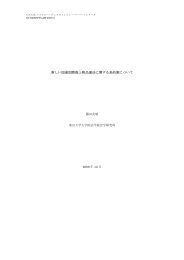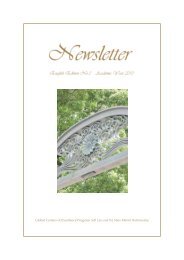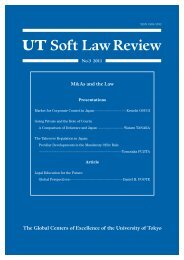UT Soft Law Review
UT Soft Law Review
UT Soft Law Review
Create successful ePaper yourself
Turn your PDF publications into a flip-book with our unique Google optimized e-Paper software.
<strong>UT</strong> <strong>Soft</strong> <strong>Law</strong> <strong>Review</strong> No.2 20103. CharacteristicsThe developments described above show a few characteristics in this area in Japan. First,the rule in the statute is not clearly written and as a result whether and when a givendefensive measure is legal is relegated to proper interpretation of the relevant statutoryrevisions. 18 The most relevant are the provisions under the Companies Act, Articles 210 and247, which provide that the issuance of stock or stock warrants is enjoined if such issuance issignificantly unfair. The courts have been struggling to find an appropriate test of judicialreview.Second, the Japanese discussion and judicial development emphasize shareholderdecision. However, Bulldog Sauce is an exceptional company in that it apparently has manyshareholders friendly to the management. Usually, it seems not easy to obtain 2/3 approval ata shareholders’ meeting. What happens if the firm obtains simple majority approval at ashareholders’ meeting? What if the firm introduces a pre-bid defense plan withoutshareholders’ approval? Indeed, certain firms did introduce such defense plan withoutshareholders’ approval, but as noted above, those plans have not yet been triggered, and thusit is not clear whether the plan will be held valid by the courts if triggered.Third, with the important exception of the emphasis on shareholder decision, the ruledeveloped in recent years is similar to the one which was shaped in the United States,particularly in Delaware, in the past twenty-five years. “Necessity and proportionality” is thestandard of judicial review. However, to date, the scope of permitted discretion of a targetboard seems much narrower in Japan than in the U. S.Finally, there has been very few proposals to clarify the rule, or improve the situation, byintroducing new legislation. One proposal that was made in the past was the one to introducea European style “mandatory bid” rule, and as noted above it was partially recognized in theamendments to the SEA as effective on December 13, 2006. However, most of this area has18 Under the Companies Act of 2005, defense plans using the class of shares are possible. For instance, afirm may issue a special class of shares which does not have voting power for the part of the sharesexceeding the 20% stake of all outstanding shares. To issue such shares, the firm’s charter must state itscontent. A firm issuing common shares may convert them into such special class shares by a charteramendment, which requires 2/3 approval at the shareholders’ meeting. However, in practice, no companyhas introduced such class shares yet. There is discussion in academia as to whether such shares are alwayslawful, and the Tokyo Stock Exchange takes the view that such shares are not appropriate for existinglisted firms, as opposed to firms making IPOs. In November, 2004, an oil company issued a “golden share”(a special class share) which gave the holder of the share a veto right over all proposals submitted to itsshareholders’ meetings. However, the share was issued to the government, and it was understood that theoil company should be permitted to issue such shares to the government from a national public policystandpoint.8





